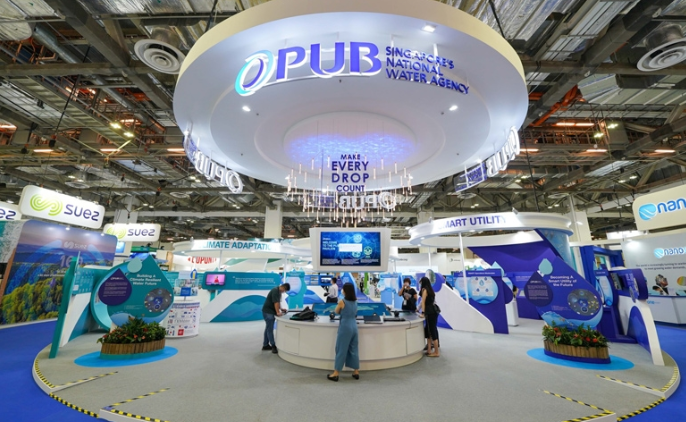Singapore Water Week Puts Climate Change Back on Global Agenda
When the United Nations’ Intergovernmental Panel on Climate Change (IPCC) released its latest report in February, Dr Debra Roberts, Co‑Chair of Working Group II (Impacts, Adaptation and Vulnerability), spelt out the sobering implications that increasing temperatures, sea‑level rises and other indicators will have for humanity, saying: “Our report shows very clearly that two‑thirds of all adaptation is in response to water‑related hazards. We cannot achieve climate‑resilient development without the water sector.”
Roberts stressed that current adaptation solutions, such as sea walls, carbon reduction efforts and mangrove swamp conservation activities, are inadequate and are not being delivered fast enough to combat the rate of change or the impacts on human life. Expanding upon this, she said: “By the time we reach global warming levels of 1.5oC, we will probably experience irreversible losses of warm water coral reefs and coastal wetlands, so they won’t be able to play that adaptation role. There’s an adaptation gap, which is unfortunately the largest for the poor and disadvantaged communities of the world.”
Echoing this sentiment, Piet Dircke, Global Solution Leader, Resilience & Water Management at Arcadis, said the time to act was before disaster struck. In support of this, he cited the example of Hurricane Ida in 2021, where the flood defences in New Orleans that cost US$14.5 billion held up. This was in stark contrast to the devastation wrought by Hurricane Katrina in 2005, when more than 1,800 people lost their lives. Similarly, he said, the Netherlands had spent billions of Euros to increase river capacity since 2007, and last year was the only European country that suffered no casualties during extensive flooding across the continent. Drawing one clear conclusion, he said: “In both cases, the government simply started doing something at a certain point, not being 100% sure of what to prevent for. That will always be the case.”
Patrick Moriarty, Chief Executive of IRC International Centre for Water and Sanitation, meanwhile, maintained that achieving the UN Sustainable Development Goal of universal availability and access to water, sanitation and hygiene by 2030 would only be possible if the current rate of progress was considerably accelerated. Amplifying this, he said: “We have done very well in the past 20 years, bringing proper sanitation to 2.5 billion people. In 2030, though, 80 countries – or two billion people – will still be without proper sanitation.”
Moriarty indicated there were two clear reasons why not enough was being done. One was political apathy, which in recent years has increased due to the demands of more pressing issues, such as Covid-19, economic disruption, natural disasters and wars. Detailing the second, he said: “As a sector we are hopelessly fragmented, and don’t care about people we don’t serve. The solution could be a ‘systems’ approach involving a joined‑up network of people and things, governments at all levels, NGOs and other stakeholders.”
Later in the event, Steve Clark, Chief Executive of SUEZ Asia, spoke about the importance of engaging private partners, saying that unlike government agencies, which possess deep knowledge of their home markets: “Private companies are able to bring experience into projects, both in terms of time – possibly many decades of experience, as well as over many geographies.
“This is our business, and we therefore have invested tens of millions of euros in R&D and have been focused on how to run projects financially efficiently. As an example, desalination plants are now 30% cheaper to build and operate. The ability to bring in international financing can also be critical; sometimes by partnering with local entities, the new joint company is bankable, and properly run, and may not need additional equity investment down the road.”
During Singapore International Water Week, Suez launched AssetAdvanced, a decision‑support platform designed to deliver smart and sustainable planning for water and sanitation infrastructure investments.
Professor Asit Biswas, Distinguished Visiting Professor at Glasgow University, agreed that digital technology in the water ecosystem was the way to go, and urged innovation toward what he called “total system visibility”. Outlining how digital solutions can help reduce wastage by building real‑time awareness of supply and demand, and an ability to shape water usage behaviour, Biswas said: “Such network visibility enables companies to bring NRW [non‑revenue water, or wastage] down to 5%; most municipalities are in the double digits. Digital also enables a ramp‑up in production efficiency with total asset visibility, to track and understand all components, to undertake preventive maintenance and reduce downtime. Lastly, we are better able to track energy usage, providing insight on where one can intervene to reduce the carbon footprint.”
Patrick Decker, President and Chief Executive of Xylem, also spoke of the impact of technology on the industry, saying: “It’s about creating awareness of the possibilities. The tech exists today that can reduce energy use by 50%, and with next to no increase in investment, due to increases in factors such as employment. Data is critically important, as well as having the processes in place to act on that data. There is also a need for business model innovation to enhance equity and availability, even in developed countries.”
Elaborating further on those themes was Peter Ng Joo Hee, Chief Executive of Public Utilities Board Singapore (PUB), who said: “We aim to reduce the energy needed for desalination by 50%. We’re exploring various ways of achieving this, such as biomimicry, or learning how sea animals get fresh water from salt water. Another way is by removing carbon from sea water before desalination; this also has the benefit of reducing the energy needed and produces hydrogen as a useful by‑product. We are also looking at expanding the use of renewables, in particular solar energy. Our floating solar‑energy farms already produce 7% of the energy needed by the PUB itself.
“Covid will go away. Climate change is coming, and it will kill us. All nations need to ramp up efforts in the 4Rs – reduce, recycle, replace – which would see us replace fossil‑fuel use with renewables, and remove as much carbon from the atmosphere as possible, as quickly as possible.”
The 2022 edition of Singapore International Water Week took place 17-21 April at Marina Bay Sands.






















































First, please LoginComment After ~